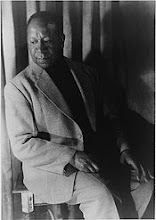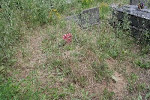By Hanna Gressler
Untitled
(1966) Oil on canvas
© Estate of Beauford Delaney
by permission of Derek L. Spratley, Esquire,
Court Appointed Administrator
My inspiration for this prose poem comes from the shapes created by the bright yellow and deep red colors in Beauford’s painting, Untitled, that seem to be telling a story. When I look at this painting, the bright colors radiate like the sun, and I am overcome by a sense of humility as I am reminded of the beauty of nature. In my prose poem, I wanted to evoke this sense of beauty and humility by describing one of the stories I find in the painting.
The sun rose as the peasants gathered. Above scattered fields, a wind blew, whistling under the wakening sky. Sunflowers flowed in the wind, brushing against each other’s petals as if swaying to a song underneath the sun. The peasant women trotted along unpaved roads with only the footsteps of previous mornings to guide them. Here, in the downtrodden streets of an impoverished French countryside, they gathered, religiously, with bare heels poking out of torn shoes, early morning on their backs and babies underneath their breasts, hovering together as if to protect one another.
Their heavy steps pressed into the mud, on and on, toward the rich yellow of the sunlight awakening above them. Gradually, limb by limb, the women could feel the sun’s warmth fill their bodies, reminding them of another life. With mouths shut tight, for it was too early in the morning to speak yet, only creases along their faces spoke of distant memories, when struggle was not a part of survival. And if both their hands were not safely holding the bums of their children, naked underneath the cloth that held them close to their mothers’ wombs as if to help them retreat back inside, then the rugged skin of the other hand, beaten and clumsily stretched onto their bodies, swung along beside them, free, the only limb not yet put to use for the day’s work. They leaned into this arm with the weight of two bodies, depending on it to hold them together, like the last surviving branch of a tree in winter that must succumb back to earth.
Like this the women walked, moving further and further toward the edge of the countryside, forming a horizon of their own where the earth will not end, but continue on for centuries, like the rise and fall of the sun, like the mothers, like these mornings. And beyond the women and the flowers, laid thick layers of hills overlapped into more distant spectacles. They glistened with such a tender texture against the dewy sky that if one were to point his finger toward the green grass wrapped around the hills, he would feel the bodies of nature rise like strokes of thick paint on a canvas, prickling the bottom of his finger, touching him with their own reality; and for a moment, intertwined with nature, he would become one with the hills, the sunflowers, the women, everlasting.
Hanna Gressler is a rising senior at the American University of Paris. She is serving as a 2017 summer intern for the Wells International Foundation.
(1966) Oil on canvas
© Estate of Beauford Delaney
by permission of Derek L. Spratley, Esquire,
Court Appointed Administrator
My inspiration for this prose poem comes from the shapes created by the bright yellow and deep red colors in Beauford’s painting, Untitled, that seem to be telling a story. When I look at this painting, the bright colors radiate like the sun, and I am overcome by a sense of humility as I am reminded of the beauty of nature. In my prose poem, I wanted to evoke this sense of beauty and humility by describing one of the stories I find in the painting.
The sun rose as the peasants gathered. Above scattered fields, a wind blew, whistling under the wakening sky. Sunflowers flowed in the wind, brushing against each other’s petals as if swaying to a song underneath the sun. The peasant women trotted along unpaved roads with only the footsteps of previous mornings to guide them. Here, in the downtrodden streets of an impoverished French countryside, they gathered, religiously, with bare heels poking out of torn shoes, early morning on their backs and babies underneath their breasts, hovering together as if to protect one another.
Their heavy steps pressed into the mud, on and on, toward the rich yellow of the sunlight awakening above them. Gradually, limb by limb, the women could feel the sun’s warmth fill their bodies, reminding them of another life. With mouths shut tight, for it was too early in the morning to speak yet, only creases along their faces spoke of distant memories, when struggle was not a part of survival. And if both their hands were not safely holding the bums of their children, naked underneath the cloth that held them close to their mothers’ wombs as if to help them retreat back inside, then the rugged skin of the other hand, beaten and clumsily stretched onto their bodies, swung along beside them, free, the only limb not yet put to use for the day’s work. They leaned into this arm with the weight of two bodies, depending on it to hold them together, like the last surviving branch of a tree in winter that must succumb back to earth.
Like this the women walked, moving further and further toward the edge of the countryside, forming a horizon of their own where the earth will not end, but continue on for centuries, like the rise and fall of the sun, like the mothers, like these mornings. And beyond the women and the flowers, laid thick layers of hills overlapped into more distant spectacles. They glistened with such a tender texture against the dewy sky that if one were to point his finger toward the green grass wrapped around the hills, he would feel the bodies of nature rise like strokes of thick paint on a canvas, prickling the bottom of his finger, touching him with their own reality; and for a moment, intertwined with nature, he would become one with the hills, the sunflowers, the women, everlasting.
Hanna Gressler is a rising senior at the American University of Paris. She is serving as a 2017 summer intern for the Wells International Foundation.




No comments:
Post a Comment